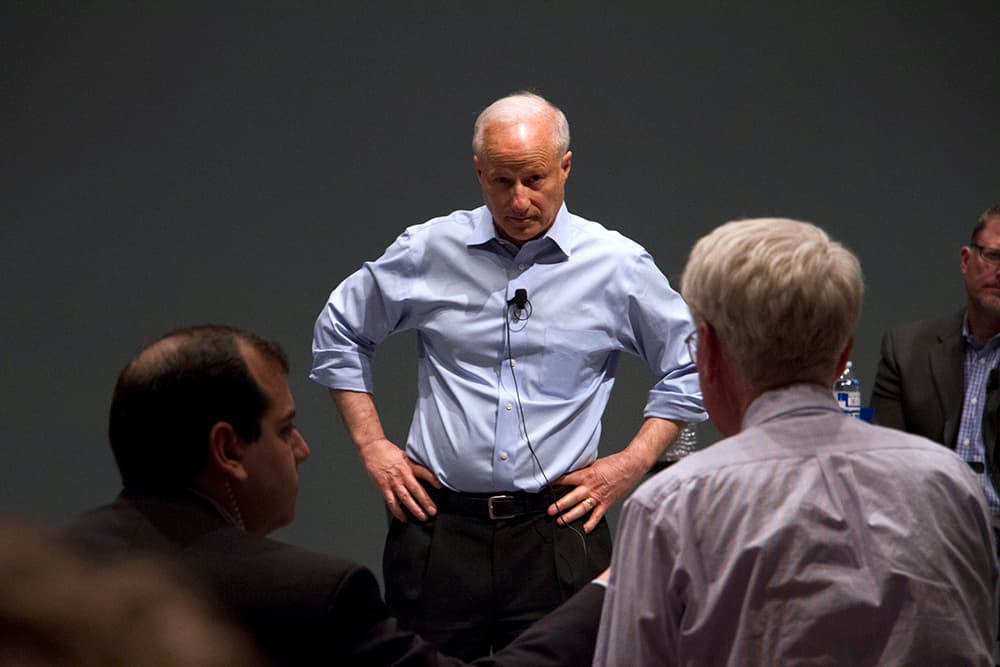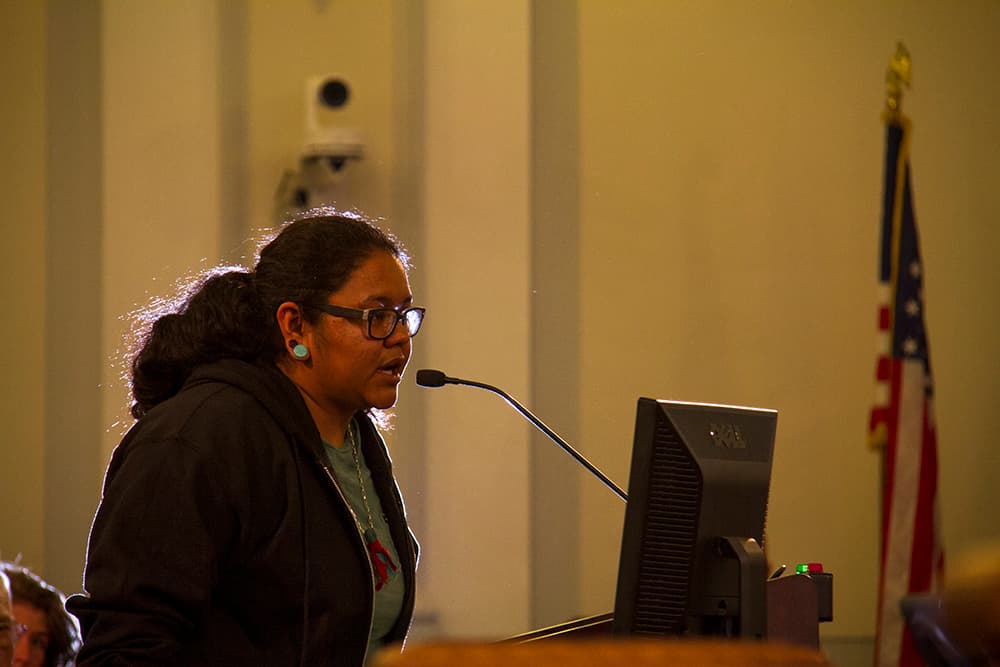
Republican leadership is struggling with a Goldilocks problem when it comes to repealing and replacing Obamacare. The measures that would win over the most conservative members of the party will alienate more moderate members and vice versa. It's hard to find a bill that is "just right."
In a letter sent this week to Speaker of the House Paul Ryan and Senate Majority Leader Mitch McConnell, U.S. Rep. Mike Coffman suggests his fellow Republicans stop trying to address so many issues in one bill and break the effort up into pieces. His proposal would get rid of major features of Obamacare that Democrats are very unlikely to give up voluntarily, like the individual mandate, the requirement that employers provide health insurance if the company is above a certain size and extra federal support for an expanded Medicaid program.
With that done, he would have Republicans reach out to Democrats to negotiate a bill that would hopefully improve conditions in the individual market so that more insurers would participate and so that more people would have insurance choices they could afford.
McConnell is expected to introduce a new draft of the Senate health care bill on Thursday. Is it too late for Coffman, who voted no on the House version of the bill, to influence the debate? He doesn't think so.
"People are not in love with it on the Senate side, so I'm really hoping that this version would have some appeal," Coffman said in an interview. "People are coming up to me. People are looking at it. The time to interject is right now to try to influence it on the Senate side."
Coffman believes leadership in the Senate will still have a hard time getting to 50 votes, even with changes that might be coming in the bill, but also that whatever comes out of the Senate is likely to get an up-or-down vote in the House rather than a debate on individual elements.
"Now is the time to put this idea forward," Coffman said.
Coffman makes three main suggestions in his letter:
- Use the reconciliation process -- which requires just a simple majority -- to get rid of the requirement that individuals have insurance and that employers of 50 or more people provide it and to phase out the federal funding for the Medicaid expansion population until it's the same 50-50 match at which the feds fund care for other Medicaid-eligible groups. The Medicaid expansion covers people earning up to 138 percent of the federal poverty limit, with the federal government picking up 95 percent of that cost.
- Don't try to pass tax cuts for higher-income Americans as part of a health care bill. Instead, put those taxes on the table as part of a broader tax reform effort expected later this year.
- Work with Democrats on a bipartisan bill to improve the private health insurance market so there are more insurers and more choices at reasonable costs.
Coffman said Republicans are struggling to pass a bill on one of their longstanding priorities because they're trying to do too much at once.
"If you have all this stuff in one massive bill, the more issues you take on, the greater the chance there are parts you just don't like," he said. "I just want to slim it down."
For example, by proposing a per-capita cap or block grants for Medicaid that could lead to reductions in services, Republicans have introduced a lot of uncertainty and fear among people who have used Medicaid for decades, like the protesters with disabilities who occupied Sen. Cory Gardner's office.
"When you look at the protests in Gardner's office, those are disabled people," he said. "That wasn't even covered in the ACA. It doesn't belong in the bill. Why take on all those issues?
"The uncertainty really scares those people," he continued. "Even if the changes won't ultimately impact your program, the uncertainty creates a lot of anxiety among the disabled community and among low-income families and among seniors, the traditional Medicaid population."
This approach won praise from the Colorado Cross-Disability Coalition.
“Keeping the traditional Medicaid intact and not subjecting this population to a per capita cap is a definite step in the right direction” said Josh Winkler, co-chair of the coalition, in an emailed statement. "We have heard loud and clear from the public over the past two weeks that people do not approve of slashing services for people with disabilities under any circumstance."
However, Julie Reiskin, director of the coalition, said her membership remains concerned about people in the expansion population, who include many people with disabilities "including people recently eligible for Social Security Disability Insurance in their two-year wait period for Medicare eligibility, people with mental illness or cognitive impairment who cannot get through the rigorous Social Security disability determination and many caregivers of people with disabilities who are out of the workforce but working very hard caring for loved ones."
About 450,000 Coloradans currently receive health care through the Medicaid expansion, and the Colorado Health Institute believes the state would struggle to come up with enough money to cover 50 percent of the cost. In some rural counties in Colorado, more than 10 percent of the population is covered by the Medicaid expansion.
This approach represents a change from Coffman's initial reaction to the American Health Care Act, the House version of the bill. Earlier this year, he praised the opportunity for a major entitlement reform. Coffman has been a supporter of moving Medicaid to a block grant system, with the idea being that states could find cost savings if they got a chunk of money and some flexibility in how they spent it, rather than just reimbursing doctors for care. Many analysts are skeptical that innovation could produce enough savings to make up for reduced spending. Nonetheless, Coffman is concerned about how much space health care spending takes up in the federal budget and about how much that number has increased under Obamacare.
In his letter, Coffman proposes having the states transition to per-capita caps or block grants -- but just for the Medicaid expansion population, not for traditional Medicaid populations like the disabled and poor children. Because the states would be picking up a much larger share of the cost of serving that population, they would have an incentive to really experiment, he wrote.
Coffman said it's a failure of Obamacare that so many people have gained coverage through the Medicaid expansion rather than the individual market, where insurers have pulled out of the exchanges and many people are paying a lot for policies with very high deductibles.
"The Medicaid piece won't have Democrat support," he acknowledged, "but that's why you do it with reconciliation. It's the right thing to do. This keeps the expansion but puts it in line with other Medicaid programs."
Coffman ultimately turned against the House version of the bill because he didn't think it did enough to protect people with pre-existing conditions and that remains a priority, he said.
"The individual mandate hasn't worked," he said. "You have to create a mechanism to help people with pre-existing conditions. Then you can provide choice for everyone else. The ACA tried to solve that by making everyone's policy the same, and it hasn't worked."
Coffman said he believes Democrats and Republicans can work together on a new set of policies around the insurance market.
"You strip the polarizing things out of it, and say, 'Look, for this particular piece, let's negotiate,'" he said. "I think you could get bipartisan support. Once you strip the politics out of it and say we'll only arrive at a decision that is bipartisan, then there will be a negotiation."
Coffman's next town hall:
When: 6 to 7 p.m., Tuesday, Aug. 1
Where: Prairie View High School, 12909 E. 120th Ave., Henderson
The event is free and open to CD-6 constituents. Registration is required.









